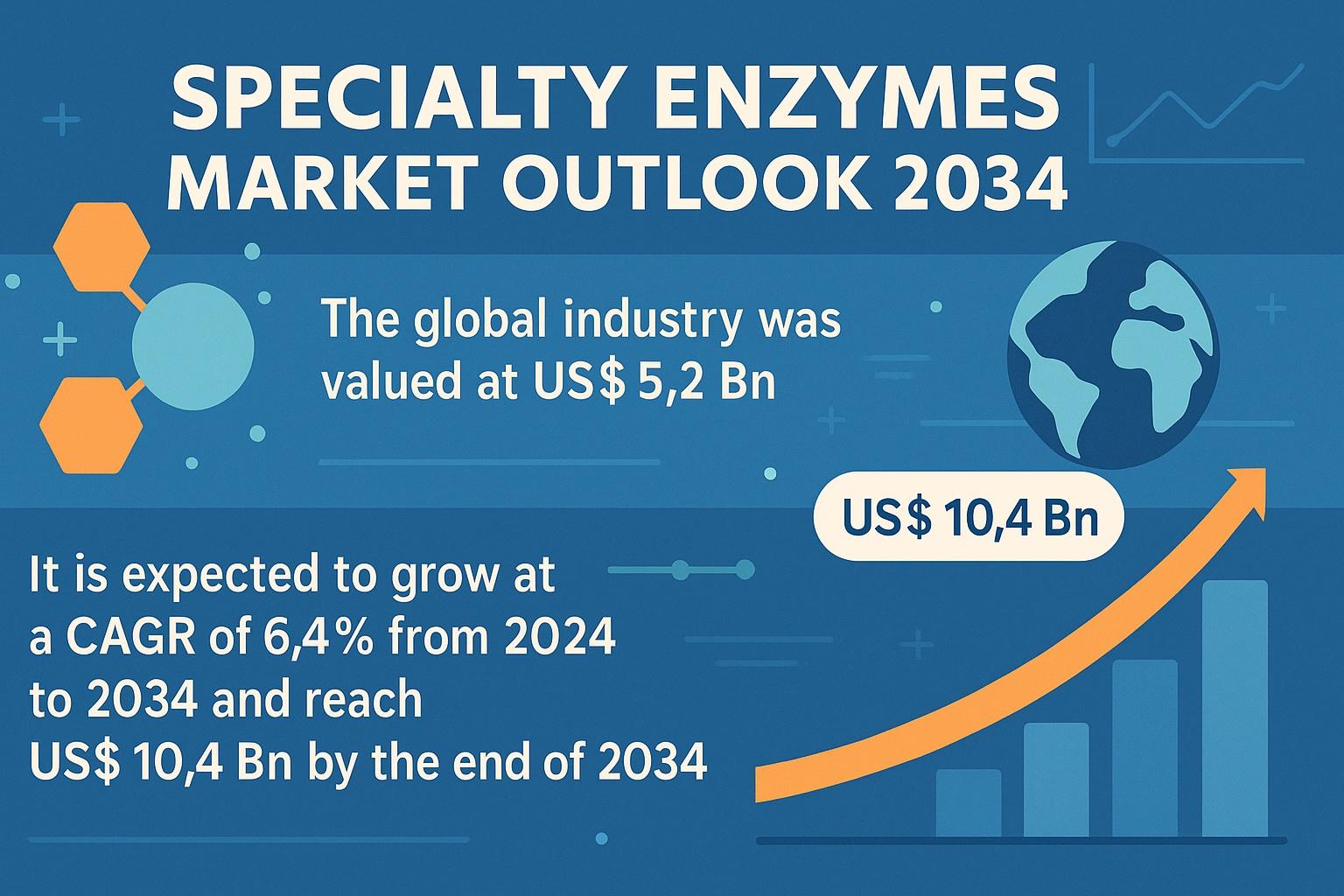-
Fil d’actualités
- EXPLORER
-
Pages
-
Groupes
-
Blogs
-
Développeurs
Specialty Enzymes Market – Driving Next-Generation Biopharma, Molecular Biology, and Sustainable Biocatalysis (One-line summary: Growing biotech R&D and regenerative therapy investments are accelerating specialty enzyme demand.)

The Specialty Enzymes Market continues to evolve as a critical pillar within biotechnology, pharmaceuticals, diagnostics, and molecular biology. Specialty enzymes—including proteases, lipases, carbohydrases, polymerases, and nucleases—serve as highly selective biocatalysts enabling precision-driven biochemical reactions. Their role in API manufacturing, DNA manipulation, genomic research, and regenerative medicine positions them at the center of scientific innovation. The global shift toward sustainable, efficient, and non-toxic catalysts has further elevated their importance in life science applications. As biotech R&D intensifies worldwide, specialty enzymes are poised to support emerging therapies, high-throughput diagnostics, and next-gen biological manufacturing.
Market Outlook 2034
-
Market Size 2023: US$ 5.2 Bn
-
Forecast 2034: US$ 10.4 Bn
-
CAGR (2024–2034): 6.4%
Steady growth is supported by expanding research in gene editing, cell therapy, synthetic biology, and enzymatic synthesis.
Analyst Viewpoint
The market is entering a high-growth phase as regenerative medicine, molecular diagnostics, and genomic engineering gain global momentum. Specialty enzymes are essential for precise biochemical transformations—making them vital in cell/gene therapies, monoclonal antibody production, mRNA synthesis, and genetic engineering. Companies are strengthening portfolios with high-purity, stable, and scalable enzyme solutions designed for advanced therapeutic workflows. Increasing preference for green catalysts also reinforces the shift toward biological enzyme-based processes over traditional chemical synthesis methods.
Key Market Drivers
1. Growing Investment in Regenerative Medicine
Regenerative medicine’s accelerating pipeline—including stem cell therapies, tissue engineering, and gene therapies—is significantly boosting enzyme demand. Specialty enzymes enable crucial steps such as scaffold preparation, DNA modification, cellular reprogramming, and controlled tissue regeneration.
Highlights
-
Specialty enzymes outperform natural enzymes due to better stability, lower cost, and easier preparation.
-
Nanozymes, with magnetic and fluorescent properties, are reshaping regenerative research and targeted therapies.
-
Increasing clinical R&D activity expands consumption of high-purity, custom-designed enzymes.
Example:
Pandorum Technologies securing US$ 11 Mn in March 2024 to advance regenerative therapy for corneal blindness demonstrates growing capital flows into enzyme-enabled therapies.
2. High Demand for Non-Toxic, Eco-Friendly Biocatalysts
Biocatalysts deliver exceptional stereoselectivity, low toxicity, and efficient conversion under mild conditions—making them ideal for pharmaceutical and industrial biotechnology applications.
Key Advantages
-
Lower environmental footprint
-
High reaction specificity
-
Biodegradability
-
Compatibility with green chemistry initiatives
Funding for molecular biology research strengthens this trend; for example, Constructive Bio’s US$ 15 Mn seed round (2022) underlined continued investment in enzyme-driven molecular engineering technologies.
3. Dominance of Research & Biotechnology Applications
Research & biotechnology held the largest market share in 2023, driven by expansion in genomics, DNA sequencing, molecular diagnostics, and PCR technologies.
Role of Polymerases & Nucleases
-
Gene cloning
-
Sequencing
-
DNA labeling
-
Mutagenesis
-
Recombinant DNA manipulation
-
CRISPR workflows
As global laboratories increase molecular research output, demand for specialty enzymes rises proportionally.
Regional Analysis
North America Remains the Leading Market
North America commanded the largest revenue share in 2023 due to:
-
Strong biopharma R&D ecosystem
-
Extensive academic research networks
-
High investment in enzyme engineering and advanced therapies
-
Growing collaborations between biotech firms and enzyme manufacturers
Strategic Example:
In 2021, Novozymes partnered with Novo Nordisk to co-develop enzymes for biopharma processing—strengthening the region’s innovation leadership.
Competitive Landscape
Companies are focusing on:
-
Advanced enzyme engineering
-
High-stability and high-purity formulations
-
Expanding applications in genetic engineering and regenerative medicine
-
Collaborations with research institutions
-
Development of nanozyme-based solutions
Key Market Participants
-
Novonesis Group
-
Amano Enzyme Inc.
-
Codexis, Inc.
-
Advanced Enzymes Technologies Ltd.
-
Thermo Fisher Scientific Inc.
-
F. Hoffmann-La Roche Ltd.
-
BBI Solutions
-
Biocatalysts
-
Amicogen
-
American Laboratories, Inc.
Recent Developments
-
2023: Novozymes + Chr. Hansen rebrand as Novonesis, marking a new era in global biosolutions.
-
2023: Amano Enzyme USA & University of Minnesota host the inaugural Enzyme Technology Symposium to promote research–industry synergy.
Market Segmentation
By Product
-
Proteases
-
Carbohydrases
-
Polymerases & Nucleases
-
Lipases
-
Others
By Application
-
Research & Biotechnology
-
Diagnostics
-
Others
By Region
-
North America
-
Europe
-
Asia Pacific
-
Latin America
-
Middle East & Africa
Conclusion
The Specialty Enzymes Market is positioned for strong expansion through 2034, driven by scientific advancements in regenerative medicine, molecular biology, sustainable catalysis, and precision biotechnology. With growing global demand for high-performance, eco-friendly enzymes, market players are accelerating innovation to support next-generation therapies and research breakthroughs.
- Books
- Software
- Courses
- Film
- Art
- Causes
- Crafts
- Dance
- Drinks
- Film
- Fitness
- Food
- Jeux
- Gardening
- Health
- Domicile
- Literature
- Music
- Networking
- Autre
- Party
- Religion
- Shopping
- Sports
- Theater
- Wellness
